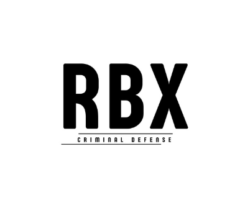Finding an expert domestic violence lawyer can be difficult. RBX Law is here to help you.
What Is Domestic Violence?
Domestic violence is abuse or threats of abuse between people in an intimate relationship (married or domestic partners, are dating or used to date, live or lived together, or have a child together). It is also when the abused person is closely related to the abusive person by blood or by marriage.
What is “Abuse”?
Abuse is not just hitting. Abuse also includes:
- Physically hurting or trying to hurt someone, intentionally or recklessly;
- Sexual assault;
- Making someone reasonably afraid that they or someone else are about to be seriously hurt (like threats or promises to harm someone); OR
- Behavior like harassing, stalking, threatening, or hitting someone; disturbing someone’s peace; or destroying someone’s personal property.
Domestic Violence Charges
Domestic Violence is punishable under Penal Code Section 243(e)(1). If the abuse causes a traumatic injury, it is punishable as a felony under Penal Code Section 273.5. It is also illegal to threaten harm, or follow or harass. Lesser offenses include battery and disturbing the peace.
Domestic Violence Penalties
The punishment for a misdemeanor domestic violence conviction is a maximum of one year in jail and/or a maximum $2,000 fine. By contrast, a felony domestic violence conviction is punishable by two, three, or four years in state prison and/or a maximum $6,000 fine.
Probation Instead of Custody Time
If the court grants probation, the terms of probation typically include a minimum 3 year probation, an order protecting the victim from further harassment or violence, payments to domestic violence programs, and community service.
In addition, the court will order successful completion of a batterer’s program or other appropriate counseling.
Community Service and Payments Instead of Fine
If the court does not impose a fine, the court can order restitution to the victim and payments to a battered women’s shelter.
Additional Penalties
Like most violent crimes, a domestic violence conviction results in loss of gun rights and can result in deportation, denial of citizenship, and exclusion from the United States.
Emergency Protective Orders
If a person is in immediate and present danger of domestic violence, the court will immediately issue an emergency order. Typically, the victim requests an emergency protective order from law enforcement. The defendant can contest the protective order at the first court date. However, the court usually doesn’t change a protective order without first speaking to the victim.
What Can the Court Order?
The court can order:
- No further violence and harassment against the victim and other persons in the residence;
- No contact with the victim and other persons;
- That the defendant move out of the residence and stay away from work, home, or school;
- Temporary custody of minor children.
Violating a Protective Order
The first violation of a protective order is a misdemeanor punishable by up to one year in jail and/or a $1,000 fine. Subsequent violations can be a misdemeanor or a felony.
Defenses
There are several defenses to domestic violence. First, it is a defense if the alleged domestic violence was accidental. In order for this defense to apply, the contact must be accidental. If the defendant intentionally did something that accidentally caused harm, it is not a defense. Another defense is that the harm was caused by another person and not the defendant. This defense is less common in domestic violence cases wherein the victim and suspect have a prior relationship. Self defense is a defense, provided the force used was reasonable under the circumstances. Finally, proving that the alleged incident never occurred is a defense.
However, cases with allegations of domestic violence are not usually dismissed by the judge or district attorney. More often, defendants must take a case to trial to prove their defense.
*The fact that the victim does not want to press charges is not a defense in a domestic violence case.
Protective Orders
After the Court issues a protective order, the order must be served on the defendant. Law enforcement usually serves a copy of the protective order on the defendant at the beginning of a case. If the Court modifies the protective order at a later time, the Court or defense attorney will be responsible for serving the defendant. Once the defendant receives a copy of the order, it is presumed that the defendant has read and understood the order.
Only intentional violations of protective orders are unlawful. It is not unlawful for the defendant to accidentally violate the protective order. However, if the victim reports a violation of the protective order, police will respond. Law enforcement can arrest the defendant if they have reason to believe that the defendant intentionally contacted the victim.
Constitutional Defenses
The United States Constitution guarantees to all persons the freedom of speech and movement. Orders restricting speech or movement must balance these freedoms against the government’s interest in maintaining public safety.
Can a domestic violence lawyer help me?
It depends on your goals and the facts of your case. If this is your first domestic violence charge and your main goal is to stay out of jail, you may not need a domestic violence lawyer. However, if this is your second domestic violence charge, or you are facing felony charges, you may need a lawyer in order to avoid doing time in jail.

